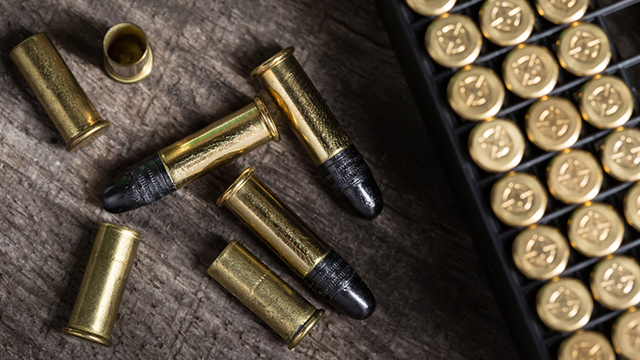 Last Friday morning, September 25, I received a message from one of my Twitter followers in the United States, asking for my help. He said that his nephew, Lane White, had been arrested at the Ninoy Aquino International Airport (NAIA) in Manila, after airport security reportedly found ammunition in his luggage. The ammunition in question was a single .22 caliber bullet.
Last Friday morning, September 25, I received a message from one of my Twitter followers in the United States, asking for my help. He said that his nephew, Lane White, had been arrested at the Ninoy Aquino International Airport (NAIA) in Manila, after airport security reportedly found ammunition in his luggage. The ammunition in question was a single .22 caliber bullet.
He also said that his nephew, who was traveling with his parents, was being pressured to sign a "confession" and pay "bail" in order to be released.
Details are still unclear, but it seems quite obvious that this is another case of extortion by law enforcers, something we hear about time and time again in the Philippines.
Being out of the country myself, I called friends who immediately reported the situation to the Philippine National Police (PNP) and other agencies. I'm sure that attention helped, but in the end, Lane, who is very likely an innocent victim, spent 5 days in the airport lockup, and was then taken to court, where he did pay bail through the legal process. The airport police of course deny that they asked for money.
To clarify, there are no law enforcement officers in this country who have the authority to set or collect bail. Bail is always set by a judge, in a courtroom hearing. And fines are likewise handled by a procedure above the level of the arresting officer. When a cop tells a detained person that he can be released upon payment of money, whether he calls it bail or a fine, what's really happening is nothing more than kidnapping and extortion. We should start calling it that.
It's worth noting that a second person reported an identical incident the same weekend. An American citizen (Filipina) traveling to the US, reported that NAIA security officials had extorted money from her after allegedly finding two bullets in her luggage. She paid out of fear. Fear of the government officials who were supposed to protect her.
There's simply no believable reason for a person to smuggle one, two, or even a handful of bullets. What purpose would it serve? That in itself makes the whole accusation ludicrous. But let's set that aside for now. Let's let the court decide the case, based on a rational evaluation of the evidence.
Sadly, this sort of thing happens way too often in the Philippines. Whether it's a case of evidence planted in luggage at the airport, or someone being "arrested" off the street by policemen, it's hard to read a newspaper without seeing at least one account of illegal detention and extortion by law enforcement officials. And we seem to place a great deal of trust in these officials, despite clear evidence that many are just plain crooked.

As a retired law enforcement officer myself, I have a few ideas that might help eliminate this problem.
Most importantly, we need to make the luggage screening process much more transparent. Allowing security officers to search a bag with any part of the process hidden, or even difficult to observe, is an open invitation to wrongdoing.
First, the x-ray machine. I believe all airport luggage scanners are capable of saving a screenshot at the push of a button. I don't know if this is standard practice at Philippine airports, but it should be required by law. A screenshot should be taken as the very first step whenever a scanner operator sees something suspicious, and that image should be submitted as part of the official report. This should happen even before the luggage is touched. No screenshot, no case!
Second, a supervisor should be summoned whenever a security officer has reason to physically search a piece of luggage, again, even before the bag is touched. This might require additional supervisors, but the current situation clearly calls for it. Again, no supervisor, no case!
And third, any physical search should be conducted in the open, in clear view of the bag owner, the supervisor, and bystanders. Place the bag on a table, and stand behind the table in a position where the bag owner can watch everything. In other words, go to great lengths to make the entire process highly visible. This should all be documented in the arresting officer's report, and included as evidence. If the cops can't show that these procedures were followed to the letter, no case!
Finally, although NAIA has a spotty record with CCTV cameras, the whole process should also be done under the watchful eye of a security camera.
This is not about mistrusting the security officer. It's about conducting a professional, legal search that will stand up in court, and about protecting the rights of accused persons. Under the current system, a crooked cop can ruin an innocent person's life, just by saying "I found something". And by virtue of his position, that cop is presumed to have done his job properly just because he said he did. In legal terms, that's called the "presumption of regularity."
In the Philippine environment though, where there are enough crooked cops to call the "presumption of regularity" into question, what we really need is "demonstration of regularity."
To paraphrase the late Jesse Robredo, what we need is a system that forces these officials to do their job the right way. - Rappler.com
Michael Brown is a retired member of the US Air Force, and has lived over 16 years in the Philippines. He writes on English, traffic management, law enforcement, and government. Follow him on Twitter at @M_i_c_h_a_e_l